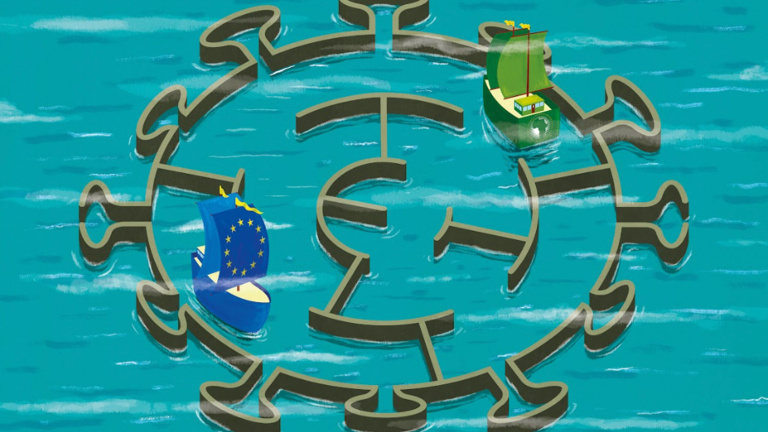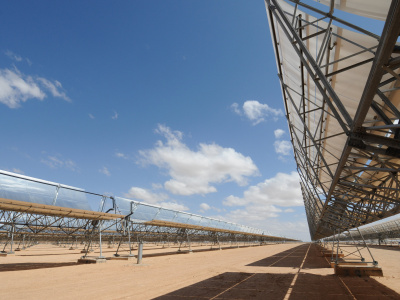
AU-EU partnership: Goals and expectations
Now at the two decade mark, the AU-EU partnership needs to be strengthened, reinvigorated and focused on delivering concrete results that are tangible for the peoples of Africa, especially its youth and women. The next AU-EU Summit will be an opportunity for AU and EU leaders to reflect on the objectives of the partnership, beyond the rhetoric.
A partnership as an instrument of transformation
This year marks 20 years since the formalisation of the partnership between the African Union (AU) and the European Union (EU). During that two decades, the partnership has matured and withstood numerous challenges. As it forges ahead, it will continue to be tested by issues such as the COVID-19 pandemic and global trends in governance, peace and security, trade, and multilateralism. These, and the impacts of poverty and inequality within and between countries, also provide opportunities to consolidate and deepen mutual understanding and promote a paradigm shift.
Attainable goals and expectations
Now, in 2020, four priority areas represent the greatest opportunities for increased collaboration and impact of the partnership:
• Peace, security and governance
• Investing in people
• Migration and mobility
• African sustainable structural transformation
African and European leaders have stood hand-in-hand to address peace, security and governance challenges as novel and growing global threats emerged. They have dedicated enormous resources and energy to fight violent extremism and terrorism, while supporting preventative diplomacy and peacebuilding. Through the African Peace Facility, the EU and its member states have been instrumental in supporting various peace programmes on the continent, in line with the African Peace and Security Architecture (APSA). With the launch in 2018, of the revitalised AU Peace Fund, with the EU and the United Nations as Board of Trustees members, AU member states have expressed their commitment to fully contribute their fair share to peace and security operations and to the goal of ‘silencing the guns’ on the continent, which is the AU’s theme for 2020.
Investing in people means putting citizens at the centre of integration and cooperation. This is the key to ensuring the sustainability of any multilateral initiative. In the case of the AU-EU partnership, jobs creation, skills development and participation at all levels of society will be needed to capitalise on Africa’s demographic dividend and maximise the contribution of its youth and women to long-term growth. The importance of this was underscored by the theme of the Fifth AU-EU Summit: ‘Investing in Youth for a Sustainable Future’. That summit was followed up by concrete joint youth initiatives and the AU’s declaration of 2020-2030 as the ‘Decade of African Women’s Financial and Economic Inclusion’.
The AU-EU partnership has facilitated dialogue towards developing a more nuanced understanding of and durable solutions to challenges related to migration and mobility. Africa has adopted a common political framework and a common position on migration and mobility. These continue to provide a roadmap for engagement and cooperation in this area (AU, 2017).
The unveiling of the African Continental Free Trade Area (AfCFTA) has created the world’s largest free-trade zone. As a primary vehicle for African sustainable structural transformation, the AfCFTA will propel growing intra-African trade and enable Africa to trade more effectively with its partners in a more sustainable manner. In this process, it will be vital to strengthen trade and sustainable investment relationships, to facilitate cross-continental value chains, to utilise tools and technology, and to attract and retain the right skills to support burgeoning industries.
Though these four areas present numerous opportunities, in several other areas further engagement is required to overcome differences and develop consensus. Key among these are mitigating illicit financial flows; application of international criminal justice and the sequencing of peace and justice; cultural relativism in human rights, particularly regarding sexual orientation, and the primacy of the AU and regional economic communities in resolution of conflicts.
To move forward on these critical issues, recognition of different approaches and candid dialogue are needed on both sides.
The way forward
In the wake of COVID-19, strengthened cooperation, coordination and delivery are called for to effectively manage the pandemic and facilitate post-pandemic recovery. The effects of the pandemic have left our economies and health care systems extremely fragile and vulnerable. Without proper planning, adequate policy formulation and a robust economic response, the work started on all of our various priorities may ultimately stagnate. Strengthening and delivering on the partnership is therefore that much more critical.
In 2020, the EU committed an initial €10 million towards implementation of the Africa Joint Continental Strategy for COVID-19 Outbreak. The AU, through its Centres for Disease Control and Prevention (Africa CDC), is working to strengthen the coordination function of the Africa Taskforce for Novel Coronavirus. However, further investments are needed to ensure that a vaccine is widely available, accessible and affordable, and to provide resources, including debt relief packages, for post-pandemic economic recovery and to ramp up surveillance to prevent the spread of other epidemics, or indeed pandemics, in the future.
The next AU-EU Summit provides an opportunity to realign the partnership priorities, sustain the strategic direction and identify quick wins. It is in the interest of both continents to welcome a renewed and streamlined partnership, based on joint socio-economic and political development, matched to Africa’s regional integration agenda. The AU-EU partnership needs to deliver on its overall vision in a transparent and coherent manner and truly benefit both parties.
Beyond the longstanding AU-EU partnership, the AU has been cementing partnerships with various other regional organizations and countries. Such other efforts are part of a global outreach mounted by a strategic, transformative and sustainable leadership of the AU Commission that remains committed to ensuring attainment of the Africa we want, recognising the need for the world to partner with Africa.
On the global stage, the AU brings the attention of investors to the fullness of what it represents, the opportunities that exist on the continent and its unimaginable endowment.
Concluding thoughts
The AU understands the importance and value of building relationships that provide mutual benefits. Now, more than ever, it engages with different regions, to promote synergies to drive development and integration of the continent. To this end, the EU will remain a key AU partner. The importance of the AU-EU partnership cannot be overstated, for good reason, as both share many years – even centuries – of common history. Africa aims to work with the EU to implement the AU’s ‘Agenda 2063’ long-term developmental framework vision and strategy. The EU should aim to work with Africa as a strong ally. The AU-EU partnership therefore needs to be strengthened, reinvigorated and focused on delivering concrete results that are tangible for the peoples of Africa, especially its youth and women. In this regard, the Sixth AU-EU Summit is an opportunity for AU and EU leaders to reflect on the objectives of the partnership, beyond the rhetoric.
References
AU. 2017. Draft Common African Position (CAP) on the Global Compact for Safe, Orderly and Regular Migration. Addis Ababa: African Union. https://au.int/sites/default/files/newsevents/workingdocuments/33023-wd-english_common_african_position_on_gcom.pdf
Eurostat. 2019. Africa-EU – international trade in goods statistics. Eurostat (online data code: Comext data code: DS-018995). Luxembourg: Eurostat.
Disclaimer: The views and opinions expressed in this article are those of the author and do not necessarily reflect the official policy or position of the African Union Commission
About the author
Dr Levi Uche Madueke is the Head of African Union Strategic Partnerships and AU Commissioner General for Expo 2020 Dubai.
Read the full magazine issue






